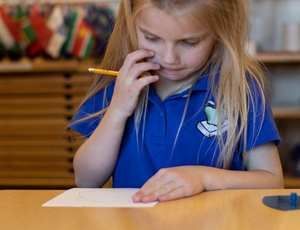Attachments and detachments are part of our life, they are natural, and they must happen to keep evolving. From the moment a child is born, there is an important physical separation from the mother's body. It takes time for the infant to realize he is not part of the mother's body anymore, and the mother also takes time to assimilate it. The way we see and live these moments will have an impact on our children, especially if they are younger than six years old, since they are still constructing themselves. In this month’s article, we will look into what a healthy attachment is, its positive impact, and how it naturally leads to a healthy detachment.
Understanding and accepting that our children grow up every day, and that they have the potential to be independent can be hard. We wait for them for nine months in the womb, we see them grow up, and it can be difficult to accept their need for freedom to explore the world without us. It is not only that they have the potential to do it, but also the desire they have to do it. They crave this independence, and we must prepare ourselves to foster it.
These detachments are experienced at a very young age, from weaning and letting go of breastmilk, to attending the first day of school or daycare. All these are situations that require us adults to be completely aware of the needs and capabilities of our children. Understanding that even if they do have the right and need to explore, they will naturally come back to us since we are their point of reference, and then they will go off again.
Here are some of the situations many parents of young children feel challenged by:
- Stopping breastfeeding and starting the weaning process.
- Starting to walk, which means the child won't need to be carried from one place to another.
- Removing pacifiers and cribs, which means the child is not a baby anymore.
- Starting to use cloth underwear instead of diapers since it means he is not a baby anymore.
- Exploring other parts of the house or environment without wanting the mom or dad as a company.
- Attending the first day of daycare or school.
Children are keen observers, and they will pick up on every gesture and expression, as well as the energy you put into the situation. If they see you having a hard time, they will also have a hard time, and they will learn that is the way to navigate through changes and new experiences.
Dr. Montessori consistently addressed the importance of recognizing children as individuals worthy of respect and trust. We must understand that young children take on the task of self-construction, and it’s a process that requires a certain privacy and conscious distance from the overview of adults.
We love knowing how our children are doing, and we enjoy knowing they want to be with us and do everything with us. Sometimes we might even feel that if they cry because they need us it is a reward for all we have done for them. However, let's stop and think about it. Are they dependent on us, or are we dependent on them? Many times, without knowing, we are the ones that model an unhealthy attachment to our children. Observe your body language and expressions when you drop your child off at school, or when he refuses to be held by you and prefers to walk. Are you giving him the message that you recognize and appreciate his need for freedom? Or do you find yourself upset by his sudden need to be without you? Does this feeling go away easily, or does it linger?
Separation is okay. To allow our children the grace of their best and most authentic development, we must give them room to grow apart from us. Young children are constructing themselves, and the way we show them how to navigate with new routines, new relationships, new concepts, new schedules, and new expectations will impact their future and how they handle it without us. Dr. Montessori used to say, “Follow the child,” and she was right, it can be a difficult task for many parents, but it must be done joyfully. Let´s have the courage to allow our children to discover and try this world out, apart from us. We can let go and still be profoundly connected.
Quote of the Month
“Education begins the moment we see children as innately wise and capable beings. Only then can we play along in their world.”
-Vince Gowma
Have a Little Extra Time?
How to Successfully Communicate Your Parenting Choices by The Montessori Show
Enjoy this one-hour conversation with Montessorians Jeanne-Marie Paynel and Simone Davies. They discuss how to share your parenting choices with other adults without conflict.
Link to watch it at Youtube.com:
Book of the Month
Thriving! Raising Confident Kids with Confidence, Character, and Resilience by Michael Grose
In this easy to read book, the author emphasizes the importance of teaching our children with our example, not words. More specifically, it talks about how we can model the qualities of character, resilience, and confidence in this ever-changing world.
Link to buy it at Amazon: Click here



